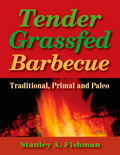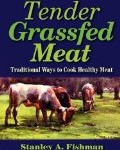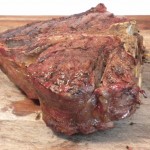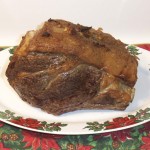A Better, Sustainable Way to Farm
By Stanley A. Fishman, author of Tender Grassfed Meat

No need for herbicides when you have goats. Note the contrast between the untrimmed and the goat trimmed areas.
There is a better way to farm. A way that uses no chemicals. A way that renews the soil, rather than depletes it. A way that produces far more food. A way that produces healthy food that our ancestors would have recognized, food that our bodies are designed to use, food that makes us strong and healthy.
- We have been told that farms should specialize in one crop or animal only.
- We have been told that farms need to use herbicide to control weeds.
- We have been told that farms need pesticides to control insects, or the crops will be lost.
- We have been told that farms need artificial fertilizer so the crops can grow.
- We have been told that we need GMOs to “feed the world.â€
- Each one of these statements is not true.
I recently had the pleasure of visiting a real farm, Chaffin Family Orchards, in Oroville, California. Chaffin has a different way of farming, a way that is the best example of sustainable agriculture that I have ever seen or heard of.
Chaffin had caught my interest because they raised a large variety of fruits, as well as eggs, chickens, goats, and lamb, but what really caught my interest was a chance to buy some of the grassfed meat they raise. They do not sell meat over the Internet, so going to the farm or a distant farmer’s market was the only way I would get to try it.
The First Surprise—Peace
My first surprise came when I stepped out of the car. I immediately felt a strong sense of harmony. It was a very powerful, yet tranquil feeling, as if I was in a holy place. I am not a mystic, and I have felt that feeling only a few times in my life. Yet it was there. Keren, my wife, also felt it. As I toured the farm, this feeling was everywhere. It was as if the fruit trees, the grass, the cows, the chickens, the land itself—were healthy, well-fed, content, at peace, and—happy.
The Second Surprise—No Stinks, No Flies
There were no bad smells on the farm. None. Every other farm I have visited had plenty of bad smells, from manure, from the livestock themselves. Not Chaffin. We visited the cows, and saw the manure scattered here and there over the pasture. No bad smell. We visited the chickens, a lot of chickens. No bad smell. In fact there were no bad smells anywhere on the farm. Every other farm I visited had areas that smelled very bad. Not Chaffin.
I had also visited a number of farms with livestock or chickens. Every one of those farms had swarms of flies and other bugs, especially in the summer. Not Chaffin. Not even in July. I did not see a single fly. There were very few bugs around.
Chaffin Raises Many Kinds of Foods
Chaffin raises olives, cherries, apricots, avocadoes, nectarines, peaches, persimmons, pomegranates, figs, grapefruits, lemons, and oranges. They also produce 100 percent grassfed beef, grassfed goats, pastured chickens, and pastured eggs.
This huge variety of nourishing food is produced on one farm. The fruits are available only in season, when they are at the peak of nutritional value and taste. The beef is harvested only once a year, after the cattle have been eating the best green grass of the year and are at their best, both in taste and nutritional value. The same is true for the chickens, and the goats. The harvesting of food in season is how it was done through most of human history, and the results are absolutely wonderful.
Chaffin Controls Weeds with Livestock—Not Poison
No artificial chemicals are used on the farm—none. This means no herbicides of any kind. So how does Chaffin deal with weeds, brambles, and thorny growths that could choke the fruit trees? The answer is very simple—cows and goats. The cows can graze among the trees, choosing the grasses they want to eat. The goats will eat bushes, including the thorny growths, as well as the weeds. The weeds and brush nourish the cows and the goats, who are eating what nature intended. The fruit trees give the cows and the goats shade from the hot sun. There is absolutely no need for herbicides, and none are used. Rotational grazing practices are used so the animals and trees support each other.
No Pesticides Needed—Just Call in the Chickens
Insects are not a problem at Chaffin Family Orchards. They use no pesticides. Instead, they move their chickens around in mobile coops as needed, to control the bug population. Bugs are the favorite food of chickens, who are not vegetarians. The bugs provide excellent feed for the chickens, resulting in the highest quality pastured eggs. The chickens are also able to forage for seeds and other plants, while on the hunt for bugs. The moving of the chickens is done on a rotational basis, in accordance with the needs of the land. I must say that the bug control method at Chaffin is the most effective I have seen at any farm.
Forget the Artificial Fertilizer—Bring on the Animals
Chaffin never uses artificial fertilizer, yet the soil is incredibly rich and fertile. The cattle, goats, and chickens deposit manure on the land. Rotational practices are used so there is never more manure on the soil than can be ideally absorbed. The manure from healthy animals eating their natural diet is of very high quality and restores nutrients to the land. Land is often given a rest from farming or grazing on a rotational basis, which allows the soil to absorb nutrients, and allows dead plant matter to decay and enrich the soil. This provides incredibly rich soil, full of nutrients and minerals. Plants grown on this good soil are strong and healthy and very resistant to disease and insects. The fruit from trees grown on this rich soil is likewise blessed with a full complement of nutrients and minerals and is incredibly sweet and delicious. Animals who eat the plants grown on this rich soil are strong, healthy, very well nourished, and provide nutrient-dense meat and eggs.
The plants, soil, and animals all support each other in this magnificent cycle which fully obeys the laws of nature.
No GMOs—Just the Fruit and Animals Developed by Nature
Chaffin Family Orchards produces a huge amount of different types of foods from the same farm, far more than if just a single crop was grown. The animals are raised on their natural foods. All of the many different fruits are natural varieties, including a number of heirloom fruits that are hard to find anywhere else, because they do not have a long shelf life. I might add that the heirloom Blenheim apricots were the best apricots I ever had. The incredible variety of nourishing food produced by this farm has no need to be modified or tampered with.
How Does It Taste?
We did come home with a moderate stash of grassfed beef from Chaffin, along with two pounds of Blenheim apricots. The apricots were gone in a day and really made me feel good after eating them. The beef had a clean, pure taste, like the essence of beefiness. It was incredibly tender, and worked perfectly with the recipes in Tender Grassfed Meat. The meat had a beautiful coating of its own natural fat, which added greatly to the flavor and tenderness. I salute Chaffin for leaving some of the fat on the meat. Every producer of grassfed meat would do well to follow their example in this. It had great marbling, full of tiny flecks of life-giving, grassfed fat, and was absolutely wonderful. I will definitely have to make the long trek to Oroville again. I also want to add that we all felt good and renewed after eating this fine beef. I should not forget to mention the olive oil, which is the best I have ever had, and works perfectly with the recipes in Tender Grassfed Meat.
I have just scratched the surface of what I could write about Chaffin Family Orchards. I also want to thank their sales manager, Chris Kerston. Chris not only gave me a fine tour of the farm, but taught me so much about the kind of farming they do, and agriculture in general. Chris is literally a walking encyclopedia on farming, and I wish his methods were taught in agricultural colleges, rather than the factory farming that dominates them. Chris is absolutely passionate about his craft, and I am grateful to everybody at Chaffin Family Orchards for the fine food they produce, in the most sustainable way.
This post is part of Real Food Wednesday Blog Carnival at Kelly the Kitchen Kop.
This post is part of Fight Back Friday Blog Carnival at Food Renegade.


 Photos of recipes from the new book Tender Grassfed Barbecue
Photos of recipes from the new book Tender Grassfed Barbecue
 Photos of recipes from the cookbook Tender Grassfed Meat
Photos of recipes from the cookbook Tender Grassfed Meat